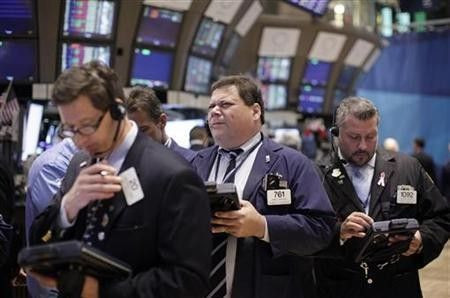Cyprus Bailout Concerns Weigh Down US Stock Futures

U.S. stock index futures point to a lower opening Monday as investor sentiment was weighed down by a controversial bailout plan for Cyprus that would impose a levy on savers' deposits.
Futures on the Dow Jones Industrial Average were down 0.60 percent, futures on the Standard & Poor's 500 Index were down 0.98 percent and those on the Nasdaq 100 Index were down 1.25 percent.
Global markets tumbled Monday as an unexpected mandate on the Cyprus bailout package reignited euro zone concerns. The euro zone finance ministers and the International Monetary Fund (IMF) have agreed to hand the cash-strapped island nation a bailout worth 10 billion euros ($13.1 billion) but demanded Cyprus' savers to pay as much as 10 percent of their deposits when banks open Tuesday in exchange for a bailout deal for the country’s troubled banking sector.
As a condition for the package, the Cyprus government has agreed to impose a one-time 9.9 per cent tax on all accounts over 100,000 euros and 6.75 percent on deposits less than the threshold, a move which is expected to raise 5.8 billion euros ($7.5 billion). Cyprus President Nicos Anastasiades has said the terms of the bailout have to be accepted to avoid the "catastrophic scenario of disorderly bankruptcy."
However, the proposal is yet to be approved by the Cypriot Parliament. The parliamentary vote on highly controversial bailout is expected to take place later Monday but a favorable vote remains uncertain with the government controlling only 28 of 56 seats. Analysts warned that the imposition of bank levy on private depositors in Cyprus banks may send the wrong message on the safety of bank deposits in other EU nations.
“While the EUR 10 billion bailout is small change compared to other euro zone bailouts the deposit levy could have wide ranging repercussion on euro zone bank deposits in other peripheral countries despite Cyprus’ case being labeled as “unique”,” said a note from Credit Agricole.
U.S. stock markets fell Friday, ending the longest winning streak for the Dow in nearly 17 years. The Dow Jones Industrial Average declined 0.17 percent, the S&P 500 Index was down 0.16 percent and the Nasdaq Composite Index fell 0.30 percent.
Meanwhile, data released Friday by the Federal Reserve showed that Industrial Production, which measures the change in the total inflation-adjusted value of output produced by manufacturers, mines and utilities, rose to 0.7 percent in February, above economists' forecast of 0.6 percent.
European stock markets were trading sharply lower, with Germany's DAX30 declining 1.26 percent, France's CAC 40 plunging 1.28 percent and London's FTSE 100 slipping 1.02 percent.
Asian stock market plunged Monday on Cyprus bailout fears. Japan’s Nikkei slumped 2.71 percent and Hong Kong’s Hang Seng plunged 2 percent, while Chinese Shanghai Composite declined 1.68 percent and India’s BSE Sensex slipped 0.61 percent.
© Copyright IBTimes 2025. All rights reserved.





















